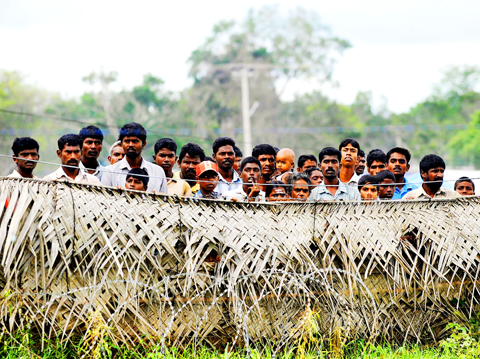Sri Lanka said yesterday it plans to let war-displaced civilians move freely in and out of internment camps ahead of completing their planned re-settlement in two months.
The announcement comes amid strong international pressure on Colombo to release tens of thousands of civilians held in the camps.
A total of 136,328 men, women and children remain inside camps across the island’s north, down from around 280,000 at the end of the fighting in May, when the Tamil Tiger guerrillas were defeated.

PHOTO: AFP
“We will allow complete freedom of movement,” senior presidential adviser Basil Rajapakse told inmates of the Manik Farm complex, the main facility housing displaced civilians.
The inmates of Manik Farm and other camps who are still being held by the government will be allowed to come and go freely from Dec. 1, he said.
The entire resettlement of internally displaced civilians will be completed according to schedule by Jan. 31, Rajapakse said at a ceremony at the complex, which lies 257km north of the capital.
The government had already said it planned to release most of the civilians by the end of January.
The adviser, who is the younger brother of President Mahinda Rajapakse, said the government wanted to complete the entire re-settlement by Jan. 31, a date promised to the UN Secretary-General Ban Ki-moon.
A batch of 41,000 people were allowed to leave the camps last month, making it the biggest single release of war displaced people held in camps.
In May, Sri Lankan troops defeated the Tamil Tiger rebels who had been fighting since 1972 to carve out a separate nation in the Sinhalese-majority island.
The government has been widely criticized for holding refugees indefinitely, but it insisted it needed time to weed out Tiger fighters hidden among the displaced civilians.
The government has also said over 1.5 million mines must be cleared and basic infrastructure needs to be in place to allow returnees to resume their normal lives.

Drug lord Jose Adolfo Macias Villamar, alias “Fito,” was Ecuador’s most-wanted fugitive before his arrest on Wednesday, more than a year after he escaped prison from where he commanded the country’s leading criminal gang. The former taxi driver turned crime boss became the prime target of law enforcement early last year after escaping from a prison in the southwestern port of Guayaquil. Ecuadoran President Daniel Noboa’s government released “wanted” posters with images of his face and offered US$1 million for information leading to his capture. In a country plagued by crime, members of Fito’s gang, Los Choneros, have responded with violence, using car

Canada and the EU on Monday signed a defense and security pact as the transatlantic partners seek to better confront Russia, with worries over Washington’s reliability under US President Donald Trump. The deal was announced after a summit in Brussels between Canadian Prime Minister Mark Carney and European Commission President Ursula von der Leyen and European Council President Antonio Costa. “While NATO remains the cornerstone of our collective defense, this partnership will allow us to strengthen our preparedness ... to invest more and to invest smarter,” Costa told a news conference. “It opens new opportunities for companies on both sides of the

The team behind the long-awaited Vera Rubin Observatory in Chile yesterday published their first images, revealing breathtaking views of star-forming regions as well as distant galaxies. More than two decades in the making, the giant US-funded telescope sits perched at the summit of Cerro Pachon in central Chile, where dark skies and dry air provide ideal conditions for observing the cosmos. One of the debut images is a composite of 678 exposures taken over just seven hours, capturing the Trifid Nebula and the Lagoon Nebula — both several thousand light-years from Earth — glowing in vivid pinks against orange-red backdrops. The new image

CYBERCRIME, TRAFFICKING: A ‘pattern of state failures’ allowed the billion-dollar industry to flourish, including failures to investigate human rights abuses, it said Human rights group Amnesty International yesterday accused Cambodia’s government of “deliberately ignoring” abuses by cybercrime gangs that have trafficked people from across the world, including children, into slavery at brutal scam compounds. The London-based group said in a report that it had identified 53 scam centers and dozens more suspected sites across the country, including in the Southeast Asian nation’s capital, Phnom Penh. The prison-like compounds were ringed by high fences with razor wire, guarded by armed men and staffed by trafficking victims forced to defraud people across the globe, with those inside subjected to punishments including shocks from electric batons, confinement